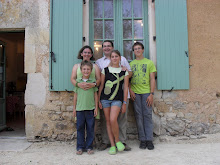
The year ended with a Christmas trip to Bali. It was quieter than it should have been after the terrible terrorist bombings. Hotels stood empty and the beach was full of women trying to sell massages or sarongs. We had a fantastic Christmas day in our resort, with Santa surfing in on the waves and delivering gifts for all the children. On Christmas Day, which is also my birthday, there was a show that our children performed in and Marc stood up and asked if he could sing happy birthday to me, and everyone sang along, as I blushed bright red on the stage!
The next morning we heard on the BBC news that there had been an earthquake and saw first reports from Sri Lanka. After we returned from a snorkeling trip later on we realized the enormity of the situation as reporters spoke of a tsunami hitting the north of Indonesia, Phuket, where we had been just a year ago, and some parts of Malaysia. We imagined what our families must be thinking and quickly called to reassure them. Prayers were said and clothes and money collected for the refugees. We spent New Year in the small town of Ubud, the atmosphere was solemn and the tourists walked quietly as if not to upset the locals. It felt like something had unleashed the god's fury and the Balinese loaded their shrines with fruit and incencse to appease the angry spirits.
Three days later we were sat on the beach and Jacques' cell phone rang. It was the French embassy in KL. They wanted to know if we were all ok. Jacques asked if they were calling all the French expats. ‘Oh no!’ The lady replied, ‘You have been reported missing by your neighbours…’ Then the line went dead. We flew back in to find all our neighbours waiting for us. One had been sure we had gone to Phuket, like we did last year, and no-one could really say for sure if it was Phuket or Bali, in the middle of Christmas shopping they had not really had time to ask specific questions. The Algerian diplomat had phoned the French embassy on our behalf. We were very touched by their kindness, but saddened to hear that a new family in the condo from South America had cancelled their last-minute trip to Langkawi and flew into Phuket the day it happened. Luckily they were on the fourth floor and survived although seeing the carnage on the beach shocked their nine-year-old daughter terribly.


